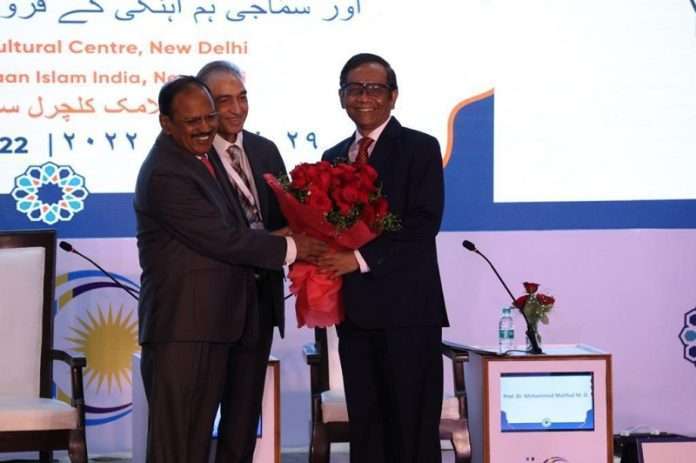By S A H Rizvi
The Times Kuwait Bureau Chief, New Delhi
If articulation is an art and words convey conviction with depth then it was India’s National Security Adviser Ajit Doval who stole the show with his brilliant speech at the inaugural session on ‘the Role of Ulema in India and Indonesia’ thereby initiating a major ideological initiative to counter terror and extremism using arms of their common tradition of tolerance and diversity.
“Together we have 1.7 billion of the world’s population to preserve and promote the true values espoused by our religions. Together we should strive to propagate moderate virtues of Islam as a beacon hope and cooperation for the entire world”, Doval said while speaking in the presence of his Indonesian counterpart Mohammed Mahfud, who had brought a delegation of Ulemas from Indonesia for the conference.

The conference “Role of Ulema in fostering peace and social harmony in India and Harmony was organised at the Indian Islamic Cultural Centre in New Delhi
The NSA said that with Indonesia, having the world’s largest Muslim population in the world, and India with the third highest, the two countries can turn the ideological balance in favour of moderation versus extremism.
In the backdrop of a major churn in the global order, a strategic partnership between India and Indonesia can foster peace, regional cooperation and prosperity in Asia, Doval said and added “It is at such times that countries like India and Indonesia with their experience of multi-faith harmony and co-existence can send a joint message to the world… This will be a powerful symbol of the determination of two large countries.”
Doval said that with the support of the Ulemas, it was essential for the two countries to proactively develop a common narrative on deradicalization. “The Ulema have a pivotal role in promoting the original teaching of tolerant principles of Islam and counter radicalisation and extremism with progressive ideas and thought.”
He said that hate speech has no space in a democracy.

NSA Doval counselled the Ulemas that in order to win the war of narratives, of which the youth are prime targets, the religious scholars must be adept at the use of technology and deploy it to counter evil designs of propaganda and hate. It is important to be “proactive and not react to agenda set by inimical forces’.
He also stressed that state institutions also needed to come together to detect and share information to counter negative influences in society.
“Both our countries have been victims of terrorism and separatism. While we have overcome the challenges to a considerable extent, the phenomenon of cross-border and ISIS-inspired terrorism continues to pose a threat. Cooperation of the civil society is essential in countering the threat from ISIS-inspired individual terror cells and returnees from theatres like Syria and Afghanistan,” Doval said.
The NSA asserted the narrative of terror cannot be justified. “None of the ends for which extremism, radicalisation and the misuse of religion are employed are justifiable on any ground. This is a distortion of religion against which all of us need to raise our voices.”

The conference follows a trip in March to Indonesia by Doval and the visit earlier this month to Bali by the Prime Minister, Narendra Modi for the G-20 summit. A pivotal state, India fully recognises Indonesia’s strategic importance as a doorway to the Indo-Pacific region.
“Extremism and terrorism are against the very meaning of Islam because Islam means peace and well-being (Salamati/Asalaam). Opposition to such forces should not be painted as a confrontation with any religion. That is a ruse,” he observed.
The NSA asserted that India and Indonesia must dig into its own historical traditions for guiding their positive discourse.
In his address the visiting Indonesian Coordinating Minister for Political, Legal and Security Affairs, Dr Mohammed Mahfud. M.D. emphasised the role of the ulema contributing immensely to foster a culture of interfaith peace and social harmony in Indonesia. He stressed on the peaceful coexistence in his country and the rejection of intolerance and discrimination by all faiths.
Dr Mahfud said,” In fact, the Ulema and other religious leaders, have been crucial parts of Indonesia’s harmonious society since the beginning of Indonesia’s history, from the time of the struggle to gain freedom from colonial powers, until the current modern times.”
“Now religious leaders are playing an important role in supporting government policies in development toward a better living conditions and prosperity of the people,” he added.
During his speech, Dr Mahfud dwelt upon the pluralistic society in Indonesia. “Religion, I think, should be a source of peace, not reason for discord, conflict, or violence. Religion should be a unifying tool, not to divisive instrument,” he said.
India Islamic Cultural Centre president Sirajuddin Qureshi who welcomed the guests said he was positive that the outcome of the conference would go a long way in fostering peace and harmony in the world. “Both India and Indonesia stands as an example of tolerance, peaceful coexistence and revels in unity and diversity”.

















